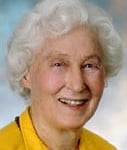Maybe Controversial? Thinking Outside One’s Parameters – Louise Ireland-Frey (Is.17)
Louise Ireland-Frey, M.D.
 Louise Ireland-Frey has been a true pioneer in Past-Life Therapy and Spirit Releasement Therapy (SRT), and here she gives us her personal view of her own ventures into “controversial” fields, in this case SRT. She considers some reasons others may have for considering new ideas controversial, but warns us at the end to keep an open mind but not an empty one.
Louise Ireland-Frey has been a true pioneer in Past-Life Therapy and Spirit Releasement Therapy (SRT), and here she gives us her personal view of her own ventures into “controversial” fields, in this case SRT. She considers some reasons others may have for considering new ideas controversial, but warns us at the end to keep an open mind but not an empty one.
Introduction
When my recent book, Freeing the Captives, was described as “controversial” ‑ in fact, as “very controversial” ‑ I was astonished. I had not thought of it as being so at all. A therapist friend commented, “I don’t feel that it is controversial, but then I know you and I am acquainted … Read the rest





